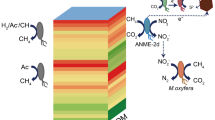Abstract.
Microbial cycling of volatile organic sulfur compounds (VOSCs), especially dimethyl sulfide (DMS) and methanethiol (MT), is intensively studied because these compounds play an important role in the processes of global warming, acid precipitation, and the global sulfur cycle. VOSC concentrations in freshwater sediments are low due to the balance between the formation and degradation of these compounds. These reactions occur for the greater part at the oxic/anoxic interphase of sediment and water column. In contrast to marine ecosystems, where dimethylsulfoniopropionate is the main precursor of MT and DMS, in freshwater ecosystems, VOSCs are formed mainly by methylation of sulfide and to a lesser extent from the degradation of S-containing amino acids. One of the major routes for DMS and MT formation through sulfide methylation is anaerobic O-demethylation of methoxylated aromatic compounds. Inhibition studies have revealed that the major part of the endogenously produced MT and DMS is degraded anaerobically by methanogens. The major bacterial groups involved in formation and consumption of VOSCs are described.
Similar content being viewed by others
Explore related subjects
Discover the latest articles, news and stories from top researchers in related subjects.Author information
Authors and Affiliations
Additional information
Received 27 August 2001; received after revision 12 October 2001; accepted 6 November 2001
Rights and permissions
About this article
Cite this article
Lomans, B., van der Drift, C., Pol, A. et al. Microbial cycling of volatile organic sulfur compounds. CMLS, Cell. Mol. Life Sci. 59, 575–588 (2002). https://doi.org/10.1007/s00018-002-8450-6
Issue Date:
DOI: https://doi.org/10.1007/s00018-002-8450-6




